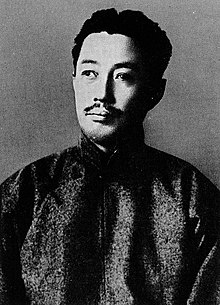Kita Ikki
| Kita Ikki | |
|---|---|

Kita Ikki (北 一輝 Kita Ikki?)
|
|
| Born | Kita Terujirō (北 輝次郎?) April 3, 1883 Sado Island, Niigata Prefecture, Japan |
| Died | August 19, 1937 (aged 54) |
| Occupation | Author |
| Language | Japanese |
| Nationality | Japanese |
| Education | Waseda University |
| Period | 1906–1919 |
| Subject | Political philosophy |
| Notable works | An Outline Plan for the Reorganization of Japan (日本改造法案大綱 Nihon Kaizō Hōan Taikō?) 1919 |
Ikki Kita (北 一輝 Kita Ikki?, 3 April 1883 – 19 August 1937) (real name: Kita Terujirō (北 輝次郎)) was a Japanese author, intellectual and political philosopher who was active in early-Shōwa period Japan. A harsh critic of the Emperor system and the Meiji Constitution, he asserted that the Japanese were not the emperor's people, rather the Emperor was the "people's emperor". He advocated a complete reconstruction of Japan through a form of statist, right-wing socialism. Kita was in contact with many people on the extreme right of Japanese politics, and wrote pamphlets and books expounding his ideas. The government saw Kita's ideas as disruptive and dangerous; in 1937 he was implicated, although not directly involved, in a failed coup attempt and executed. He is still widely read in academic circles in Japan.
Kita was born on Sado Island, Niigata Prefecture, where his father was a sake merchant. Sado island had a reputation for being rebellious, and Kita took some pride in this. He studied Chinese classics in his youth and became interested in socialism at the age of 14. In 1900 he began publishing articles in a local newspaper criticizing the Kokutai theory. This led to a police investigation which was later dropped. In 1904 he moved to Tokyo, where he audited lectures at Waseda University. He met many influential figures in the early socialist movement in Japan but quickly became disillusioned; the movement was, according to him, full of "opportunists".[nb 1]
...
Wikipedia
